Understanding Alzheimers
Also from Naheed Ali
Diabetes and You: A Comprehensive, Holistic Approach
The Obesity Reality: A Comprehensive Approach to a Growing Problem
Understanding Alzheimers
An Introduction for Patients and Caregivers
Naheed Ali
ROWMAN & LITTLEFIELD PUBLISHERS, INC.
Lanham Boulder New York Toronto Plymouth, UK
Published by Rowman & Littlefield Publishers, Inc.
A wholly owned subsidiary of The Rowman & Littlefield Publishing Group, Inc.
4501 Forbes Boulevard, Suite 200, Lanham, Maryland 20706
www.rowman.com
10 Thornbury Road, Plymouth PL6 7PP, United Kingdom
Copyright 2012 by Rowman & Littlefield Publishers, Inc.
All rights reserved . No part of this book may be reproduced in any form or by any electronic or mechanical means, including information storage and retrieval systems, without written permission from the publisher, except by a reviewer who may quote passages in a review.
British Library Cataloguing in Publication Information Available
Library of Congress Cataloging-in-Publication Data
Ali, Naheed, 1981
Understanding Alzheimers : an introduction for patients and caregivers / Naheed Ali.
p. ; cm.
Includes bibliographical references and index.
ISBN 978-1-4422-1753-9 (cloth : alk. paper)ISBN 978-1-4422-1755-3 (electronic)
I. Title.
[DNLM: 1. Alzheimer Disease. WT 155]
616.8'31dc23 2012013305
 The paper used in this publication meets the minimum requirements of American National Standard for Information SciencesPermanence of Paper for Printed Library Materials, ANSI/NISO Z39.48-1992.
The paper used in this publication meets the minimum requirements of American National Standard for Information SciencesPermanence of Paper for Printed Library Materials, ANSI/NISO Z39.48-1992.
Printed in the United States of America
Understanding Alzheimers is dedicated
to my students, to Alzheimers disease patients,
and to all who provided encouragement and
support throughout my research.
Disclaimer
T his book represents reference material only. It is not intended as a medical manual, and the data presented here is meant to assist the reader in making informed choices regarding wellness. This book is not a replacement for treatment(s) that may have been suggested by the readers personal physician. If the reader believes he or she is experiencing a medical issue, professional medical help is recommended. Mention of particular products, companies, or authorities in this book does not entail endorsement by the publisher or author.
Preface
P eople suffering from a particular disease will have abnormal or deviated characteristics, but anyone can study the abnormalities and explore their possible cure. People want to stay in touch with friends and want to lead a happy and joyful life, and since a healthy body makes a healthy mind and keeps it sharp, it is important to learn about diseases such as Alzheimers if one wants to keep up with life and maintain its spark.
As a person gets older, he or she faces memory and cognitive problems. It is a simple fact of nature. Forgetfulness becomes a noticeable part of everyday life with every passing minute, hour, and day. This is why it can be very difficult to recognize the early stages of Alzheimers disease. Studying Alzheimers disease is, in this sense, of utmost importance for aging individuals and the people who look after them. Understanding the disease in its entirety also makes it easier for patients to cope with their specific problems. Alzheimers disease is currently the most rapidly growing neurodegenerative disease. People above sixty-five years of age have a high tendency of being affected by this disease, and additional statistics show that almost thirty million of the worlds population is suffering from Alzheimers. Learning about other diseases is also very important because doing so provides an individual with adequate knowledge of what tests should be conducted before and after a successful diagnosis. On the other hand, one might be suffering from not Alzheimers but rather another form of mild dementia. It is important to rule out all the possibilities of any serious illness.
It can be difficult to recognize the symptoms of Alzheimers disease. However, it is important to recognize the early symptoms which emerge before any signs of memory loss or brain damage is actively recorded. As the complete cure for this disease is yet to be unearthed, researchers try to focus on people with a probable risk of being affected and reduce any kind of fear or other psychological factor. Alzheimers research uses volunteers who are already affected by the disease, under the supervision of the latest technology, to determine the root causeand possible cureof the problem.
Elderly people want to lead a healthy and peaceful life just as much as everyone else. However, remembering the important events and tasks, such as a grandsons birthday, the last day to submit an important assignment, or the time and date of an appointment with a doctor, can be difficult with Alzheimers disease. No one really wants to forget the important activities and tasks of life. Alzheimers is a fatal disease that, in most severe cases, can take away ones cognitive ability to think and to remember basic events. The problem can even separate two loved ones.
Alzheimers can be categorized by three different staging systems, each explained comprehensively in part IV. The initial phase (of each of the staging systems) is usually the most difficult one to spot. It is very important for individuals who wish to provide care to their family members or to their loved ones to understand the stages of this disease. Medical studies confirm that the early phases of the disease, no matter the staging model used, can be very deceptive. Physicians and scientists are trying to find a solution for detecting the first phase of the disease. They believe that, if the early phase is detected, patients can be treated easily by psychologists. The memory impairments associated with Alzheimers can be treated but not cured, while other symptoms of the disease can be easily avoided.
The Harvard School of Public Health conducted a recent survey that focused on awareness and concern about Alzheimers disease among participants in Europe and the United States. The results of this survey were mind-boggling and showed that more than 86 percent of the participants in Europe and America are afraid of the disease and say they would be relieved to discover early on that they suffer from it, rather than finding out after the disease reaches terminal levels. The results also suggested that Alzheimers is the second-most feared medical problem, with cancer being the first. Most of the surveyed people, especially adults, were able to identify the symptoms of the disease in themselves. They reported experiencing common symptoms such as forgetting important tasks and losing a sense of direction while on their way to college or home. Approximately thirty respondents in European countries were confident that a cure exists. They believed the progression of the disease can be slowed down and that a permanent form of treatment exists.
Before moving on deeper within this book, the reader should know that the journey to treating Alzheimers disease can be difficult because of its relation to other brain disorders. If not detected early, Alzheimers can lead to other fatal ailments such as Parkinsons disease. It would then be extremely difficult to cope with both diseases, and in most cases, the patient would have little chance of escaping death unnaturally. The root cause of brain-related illness should, therefore, be dealt with quickly to prevent any serious injury to the brain or to other vital organs. Ways of overcoming the illness should be learned as soon as possible, rather than having the patient go through otherwise avoidable challenges.

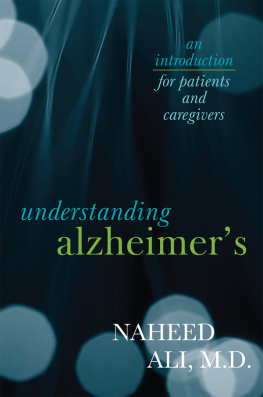
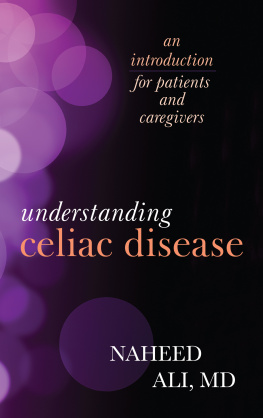
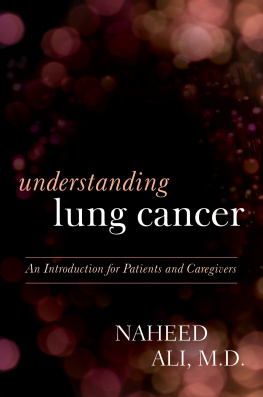
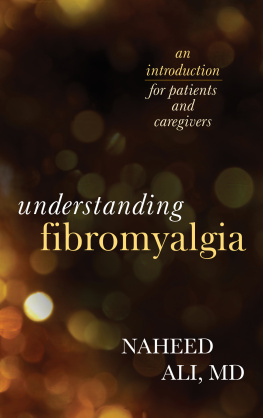
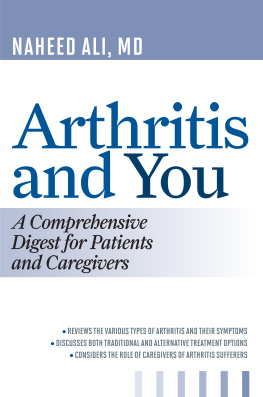

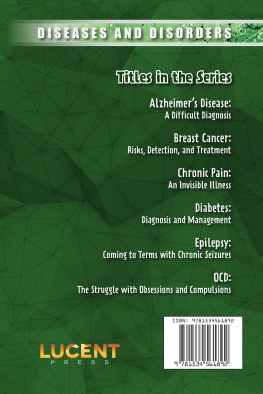
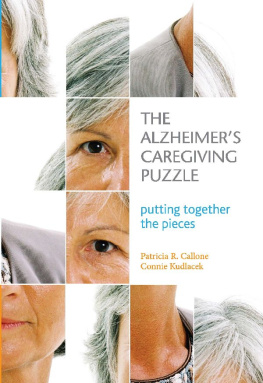
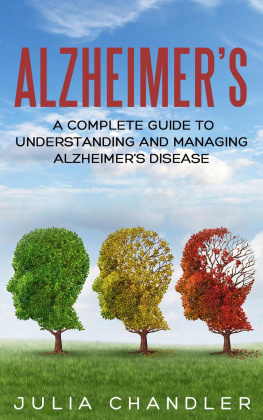
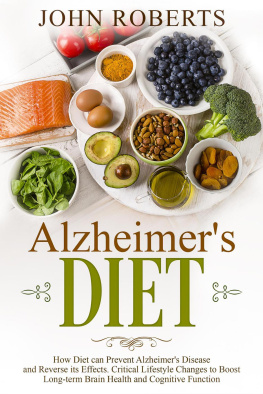
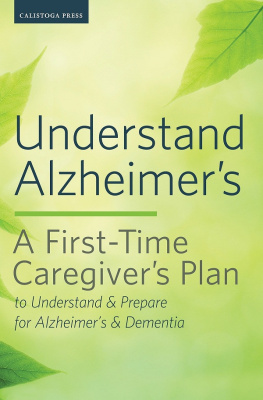
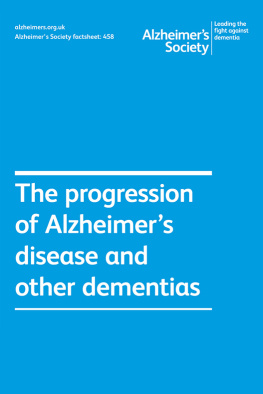
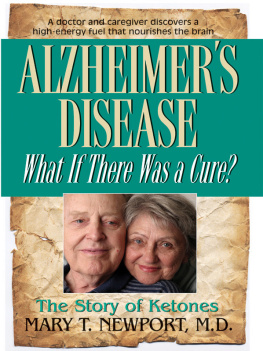
 The paper used in this publication meets the minimum requirements of American National Standard for Information SciencesPermanence of Paper for Printed Library Materials, ANSI/NISO Z39.48-1992.
The paper used in this publication meets the minimum requirements of American National Standard for Information SciencesPermanence of Paper for Printed Library Materials, ANSI/NISO Z39.48-1992.